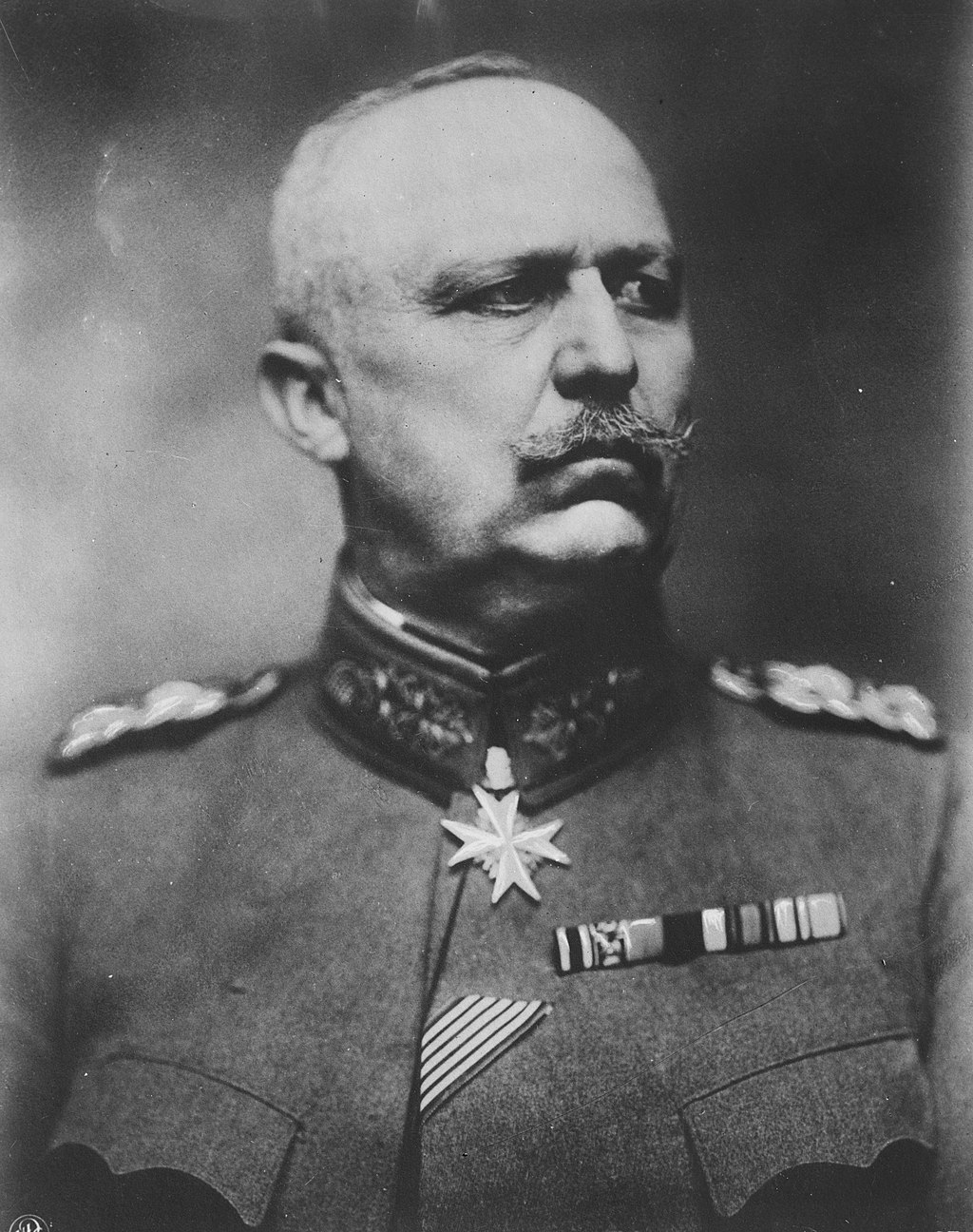General Erich Friedrich Wilhelm Ludendorff was born on April 9, 1865, in the village of Kruszewnia near the city of Poznań, the son of a landowner and a retired military man. He graduated in 1882 from the Royal Prussian Main Cadet Institute in Lichterfelde near Berlin. A decade later, he graduated from the Military Academy. In 1894, he was sent to Russia for six months to study. Starting in 1906, he taught tactics and military history at the Military Academy. In 1908, Ludendorff began working in the General Staff as head of the Second Section, in charge of mobilization. In 1913, he was transferred to command a regiment in Düsseldorf, a year later becoming commander of an infantry brigade in Strasbourg. He fought in World War I. Along with Paul von Hindenburg, he commanded the German army during the Russian invasion of East Prussia in 1914 and became chief of staff on the Eastern Front later that year. In 1916, Ludendorff was named first quartermaster general.¹
In 1918, he took part in the negotiations in Brest and Bucharest, where he defended the annexation of a number of territories by Germany. In October of that year, Ludendorff resigned and, with the outbreak of the revolution in Germany, left for Sweden in November. A year later, the retired general returned and entered politics. He was associated with right-wing political movements and was involved in the Kapp Putsch of 1920, after which he met Russian General Vasily Biskupsky. He moved to Bavaria and settled in Munich. Ludendorff became close to Adolf Hitler and led the Beer Hall Putsch in 1923. After its failure, he was tried, but acquitted.²
In 1924, he was elected to the Reichstag from the National Socialist Freedom Movement. He ran for president in 1925. He founded the Tannenbergbund nationalist political society. He grew interested in esotericism and mysticism, and eventually split with Hitler and in 1930 the German People society. As the Nazis came to power in Germany, Ludendorff’s organizations were banned. He wrote a number of military memoirs. In 1935, he refused the rank of field marshal from Hitler. On December 20, 1937, Ludendorff died in Munich.³
In 1918, he took part in the negotiations in Brest and Bucharest, where he defended the annexation of a number of territories by Germany. In October of that year, Ludendorff resigned and, with the outbreak of the revolution in Germany, left for Sweden in November. A year later, the retired general returned and entered politics. He was associated with right-wing political movements and was involved in the Kapp Putsch of 1920, after which he met Russian General Vasily Biskupsky. He moved to Bavaria and settled in Munich. Ludendorff became close to Adolf Hitler and led the Beer Hall Putsch in 1923. After its failure, he was tried, but acquitted.²
In 1924, he was elected to the Reichstag from the National Socialist Freedom Movement. He ran for president in 1925. He founded the Tannenbergbund nationalist political society. He grew interested in esotericism and mysticism, and eventually split with Hitler and in 1930 the German People society. As the Nazis came to power in Germany, Ludendorff’s organizations were banned. He wrote a number of military memoirs. In 1935, he refused the rank of field marshal from Hitler. On December 20, 1937, Ludendorff died in Munich.³

Erich Ludendorff (1865-1937)
Erich Ludendorff
Source
Source

Content Oriented Web
Make great presentations, longreads, and landing pages, as well as photo stories, blogs, lookbooks, and all other kinds of content oriented projects.
[1] Vishlov, Oleg. ‘Lyudendorf’. Bol’shaya Rossiyskaya Entsiklopediya, 2019. https://bigenc.ru/world_history/text/2161874.
[2] Khronos. ‘Erikh Lyudendorf’. Khronos, 2012. http://www.hrono.ru/biograf/bio_l/ludendorff.php.
[3] Thoß, Bruno. ‘Ludendorff, Erich’. Neue Deutsche Biographie, 1987. https://www.deutsche-biographie.de/gnd118574841.html#ndbcontent.
[2] Khronos. ‘Erikh Lyudendorf’. Khronos, 2012. http://www.hrono.ru/biograf/bio_l/ludendorff.php.
[3] Thoß, Bruno. ‘Ludendorff, Erich’. Neue Deutsche Biographie, 1987. https://www.deutsche-biographie.de/gnd118574841.html#ndbcontent.